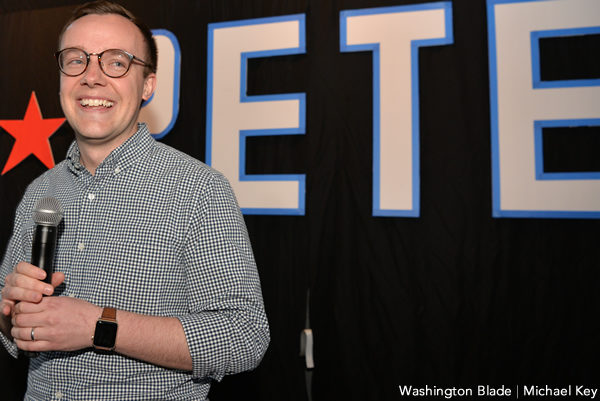Books
‘I Have Something to Tell You’ not typical, political puff piece
Chasten Buttigieg memoir a frank look at history-making campaign


As a tween, if you’d said that one day a gay man, with his husband as First Man, could be president of the United States, I’d have thought you were nuts.
I’m glad Pete Buttigieg, 38, the former mayor of South Bend, Ind., proved me wrong! In April 2019, he became the first openly gay major presidential candidate. Buttigieg dropped out after losing badly in the South Carolina primary due to his failure to connect with Black voters.
You may or may not like Buttigieg’s politics. But I’d bet that if you’re queer, you were awed by the history he made by entering the presidential race!
One of the most moving parts of the campaign was Buttigieg’s marriage to Chasten Glezman Buttigieg. “Nothing in my life, from shaking hands with a president to experiencing my first rocket attack,” Pete Buttigieg wrote in his memoir “Shortest Way Home,” “matched the thrill of holding Chasten’s hand for the first time.”
Chasten Buttigieg, 31, who has more than 400,000 Twitter followers, was a major asset to Pete Buttigieg’s campaign. Chasten, who was raised in Traverse City, Mich. and calls Pete Buttigieg “Peter,” has written a funny, touching memoir.
Often, memoirs of political campaigns are merely pablum. “I Have Something to Tell You,” released on Sept. 1, is far from a hard-nosed take on the Buttigieg campaign. How could Chasten be objective about his husband? From the moment when Chasten and Pete eat Scotch eggs on their first date, Chasten is totally smitten with Peter. Peter is intelligent, unflappable and caring. “The only thing that’s annoying about Peter’s lifestyle is how reasonable and laid back he is about, well, everything,” Chasten writes.
It’s clear that since the campaign ended, Pete Buttigieg has been working to extend his brand. His 20-episode podcast “The Deciding Decade” premiered on Sept. 9, and his new book “Trust: America’s Best Chance” comes out on Oct. 6. Chasten’s memoir fits into the effort to build Pete Buttigieg’s political future.
Yet, “I Have Something to Tell You” isn’t your typical, political puff piece. It’s often refreshingly candid. It gives us a ringside seat to what it was life to be the first spouse of the first gay presidential candidate.
Chasten realized how important he and Pete Buttigieg (as a presidential candidate and spouse) were to the LGBTQ community two weeks before Buttigieg officially announced he was running. An older woman, recognizing the political couple, stopped them as they walked down 14th Street in Washington, D.C. “I’m the mother of two gay children,” she told them, “and what you’re doing for this country and for them … I am just so proud of you and so happy you’re getting out there.”
Life during the campaign was, in some ways, the same for Chasten as it was for the spouses of the other candidates. As was the case for them, Chasten knew that there was “only one star” in his campaign—and it was his husband Peter—not him. Along with the other spouses, he sat in the front row, watching the candidates’ debates. Sometimes, the spouses exchanged small talk.
In other ways, being a gay candidate’s spouse was different for Chasten. After the Buttigieges kissed at the campaign launch, a commentator said, “something like ‘Of course, I don’t mind if they kiss in public’ … ,” Chasten writes, “but … ’real Americans’ elsewhere wouldn’t stand for it.’”
It isn’t Chasten’s job to be a political analyst. Yet, his failure to acknowledge Pete Buttigieg’s disconnect with Black and Latinx people is a glaring omission. Especially, after the George Floyd protests.
This being said, “I Have Something to Tell You” is well-worth reading. The Buttigieg campaign is the main point of historical interest. Yet, the memoir is, also, a riveting account of Chasten’s life. Chasten movingly describes his experiences of sexual assault and domestic violence (issues seldom talked about in the queer community) as well as his struggle to go to college while holding several jobs and acquiring student debt.
For a frank, inside look at a campaign that made history, check out “I Have Something to Tell You.”

Books
How one gay Catholic helped change the world
‘A Prince of a Boy,’ falls short of author’s previous work

Brian McNaught, the pioneering gay activist and author of 1986’s “On Being Gay” and 1993’s “Gay Issues in the Workplace,” has written a personal account about his Catholic faith and homosexuality. It is a memoir without much substance.
“A Prince of a Boy: How One Gay Catholic Helped Change the World” (Cascade Books) is a strong personal statement by McNaught. He helped change family relationships. He helped change attitudes about homosexuality. He helped change workplaces, but the world?

In January 2023, the Catholic News Service reported that Pope Francis announced that, “being homosexual is not a crime.” In December 2023, NPR reported that Pope Francis approved “Catholic blessings for same-sex couples, but not for marriage.” Francis died Monday at age 88. Although Catholics may not see homosexuality as a crime, they see sex outside of marriage as a sin. They see same-sex marriage as a sin.
In 2021, Gallup reported that membership in the Catholic Church had declined 20 percent since 2000. In 2025, the Pew Research Center’s Religious Landscape Study found that nearly 40 percent of Americans identified as Protestant, while the same study found that only 19 percent identified as Catholic.
McNaught devotes much of his book to his life as a gay Catholic. It is challenging to read about his personal struggle. Some readers may find it interesting. Others might find it boring. Catholic readers may find it more compelling than Protestant readers.
As the above statistics prove, McNaught has much more work to do to change the Catholic Church’s views about homosexuality. We should be glad for his contribution to the debate within the Catholic Church. We should pray for full acceptance of gays in the Catholic Church.
“A Prince of a Boy” becomes more interesting when McNaught describes his work as an educator on LGBTQ issues. He has had an impact on workplace policies, academic programs, and public education, and his lectures, books, and other materials are widely used.
Based on my experience in the federal government and volunteering with LGBTQ organizations from the Bay Area to Washington, D.C., I believe McNaught’s work as an educator has improved LGBTQ lives, careers, and families. During the Clinton administration, I gave many copies of “Gay Issues in the Workplace” to personnel directors. I felt their staff could benefit from reading it. I thought it would help the lives and careers of my federal LGBTQ colleagues.
McNaught’s “A Prince of a Boy” was released in December 2024. Anti-gay crusader Anita Bryant died the same month. Bryant campaigned against a gay rights law in Florida. She began a national campaign against gays.
When Bryant successfully reversed a gay rights ordinance in Dade County, Florida, McNaught wrote the important essay “Dear Anita, Late Night Thoughts of an Irish Catholic Homosexual.” The essay is not in “A Prince of a Boy”; however, McNaught mentions Bryant.
In his training programs, McNaught describes homosexuals as journeying from confusion to denial to acceptance to pride. “Anita Bryant and AIDS brought Gay people to identity pride very quickly,” McNaught writes. San Francisco Supervisor Harvey Milk (1930-1978) and other activists reached similar conclusions about Bryant’s vicious anti-gay campaign.
McNaught helped change the LGBTQ world and brought pride to many people’s lives. McNaught walks in pride, works in pride, and educates others in pride.
“A Prince of a Boy” is a disappointing book. It provides small details about Brian McNaught’s large, proud life. A meaningful biography about this great gay leader is long overdue.
The Blade may receive commissions from qualifying purchases made via this post.
Books
‘Pronoun Trouble’ reminds us that punctuation matters
‘They’ has been a shape-shifter for more than 700 years

‘Pronoun Trouble’
By John McWhorter
c.2025, Avery
$28/240 pages
Punctuation matters.
It’s tempting to skip a period at the end of a sentence Tempting to overuse exclamation points!!! very tempting to MeSs with capital letters. Dont use apostrophes. Ask a question and ignore the proper punctuation commas or question marks because seriously who cares. So guess what? Someone does, punctuation really matters, and as you’ll see in “Pronoun Trouble” by John McWhorter, so do other parts of our language.

Conversation is an odd thing. It’s spontaneous, it ebbs and flows, and it’s often inferred. Take, for instance, if you talk about him. Chances are, everyone in the conversation knows who him is. Or he. That guy there.
That’s the handy part about pronouns. Says McWhorter, pronouns “function as shorthand” for whomever we’re discussing or referring to. They’re “part of our hardwiring,” they’re found in all languages, and they’ve been around for centuries.
And, yes, pronouns are fluid.
For example, there’s the first-person pronoun, I as in me and there we go again. The singular I solely affects what comes afterward. You say “he-she IS,” and “they-you ARE” but I am. From “Black English,” I has also morphed into the perfectly acceptable Ima, shorthand for “I am going to.” Mind blown.
If you love Shakespeare, you may’ve noticed that he uses both thou and you in his plays. The former was once left to commoners and lower classes, while the latter was for people of high status or less formal situations. From you, we get y’all, yeet, ya, you-uns, and yinz. We also get “you guys,” which may have nothing to do with guys.
We and us are warmer in tone because of the inclusion implied. She is often casually used to imply cars, boats, and – warmly or not – gay men, in certain settings. It “lacks personhood,” and to use it in reference to a human is “barbarity.”
And yes, though it can sometimes be confusing to modern speakers, the singular word “they” has been a “shape-shifter” for more than 700 years.
Your high school English teacher would be proud of you, if you pick up “Pronoun Trouble.” Sadly, though, you might need her again to make sense of big parts of this book: What you’ll find here is a delightful romp through language, but it’s also very erudite.
Author John McWhorter invites readers along to conjugate verbs, and doing so will take you back to ancient literature, on a fascinating journey that’s perfect for word nerds and anyone who loves language. You’ll likely find a bit of controversy here or there on various entries, but you’ll also find humor and pop culture, an explanation for why zie never took off, and assurance that the whole flap over strictly-gendered pronouns is nothing but overblown protestation. Readers who have opinions will like that.
Still, if you just want the pronoun you want, a little between-the-lines looking is necessary here, so beware. “Pronoun Trouble” is perfect for linguists, writers, and those who love to play with words but for most readers, it’s a different kind of book, period.
The Blade may receive commissions from qualifying purchases made via this post.
‘The Cost of Fear’
By Meg Stone
c.2025, Beacon Press
$26.95/232 pages
The footsteps fell behind you, keeping pace.
They were loud as an airplane, a few decibels below the beat of your heart. Yes, someone was following you, and you shouldn’t have let it happen. You’re no dummy. You’re no wimp. Read the new book, “The Cost of Fear” by Meg Stone, and you’re no statistic. Ask around.

Query young women, older women, grandmothers, and teenagers. Ask gay men, lesbians, and trans individuals, and chances are that every one of them has a story of being scared of another person in a public place. Scared – or worse.
Says author Meg Stone, nearly half of the women in a recent survey reported having “experienced… unwanted sexual contact” of some sort. Almost a quarter of the men surveyed said the same. Nearly 30 percent of men in another survey admitted to having “perpetrated some form of sexual assault.”
We focus on these statistics, says Stone, but we advise ineffectual safety measures.
“Victim blame is rampant,” she says, and women and LGBTQ individuals are taught avoidance methods that may not work. If someone’s in the “early stages of their careers,” perpetrators may still hold all the cards through threats and career blackmail. Stone cites cases in which someone who was assaulted reported the crime, but police dropped the ball. Old tropes still exist and repeating or relying on them may be downright dangerous.
As a result of such ineffectiveness, fear keeps frightened individuals from normal activities, leaving the house, shopping, going out with friends for an evening.
So how can you stay safe?
Says Stone, learn how to fight back by using your whole body, not just your hands. Be willing to record what’s happening. Don’t abandon your activism, she says; in fact, join a group that helps give people tools to protect themselves. Learn the right way to stand up for someone who’s uncomfortable or endangered. Remember that you can’t be blamed for another person’s bad behavior, and it shouldn’t mean you can’t react.
If you pick up “The Cost of Fear,” hoping to learn ways to protect yourself, there are two things to keep in mind.
First, though most of this book is written for women, it doesn’t take much of a leap to see how its advice could translate to any other world. Author Stone, in fact, includes people of all ages, genders, and all races in her case studies and lessons, and she clearly explains a bit of what she teaches in her classes. That width is helpful, and welcome.
Secondly, she asks readers to do something potentially controversial: she requests changes in sentencing laws for certain former and rehabilitated abusers, particularly for offenders who were teens when sentenced. Stone lays out her reasoning and begs for understanding; still, some readers may be resistant and some may be triggered.
Keep that in mind, and “The Cost of Fear” is a great book for a young adult or anyone who needs to increase alertness, adopt careful practices, and stay safe. Take steps to have it soon.
The Blade may receive commissions from qualifying purchases made via this post.
-

 Federal Government2 days ago
Federal Government2 days agoHHS to retire 988 crisis lifeline for LGBTQ youth
-

 Opinions2 days ago
Opinions2 days agoDavid Hogg’s arrogant, self-indulgent stunt
-

 District of Columbia2 days ago
District of Columbia2 days agoD.C. police seek help in identifying suspect in anti-gay threats case
-

 Opinions2 days ago
Opinions2 days agoOn Pope Francis, Opus Dei and ongoing religious intolerance










